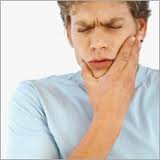 Though the term “TMJ” stands for temporomandibular Joint, the dysfunction that frequently occurs in this area involves more than just the joint. The muscles, ligaments, and cartilage that comprise the joint are all involved. As a matter of fact, as TMJ disorder progresses, the entire head, neck, and mouth can be affected.
Though the term “TMJ” stands for temporomandibular Joint, the dysfunction that frequently occurs in this area involves more than just the joint. The muscles, ligaments, and cartilage that comprise the joint are all involved. As a matter of fact, as TMJ disorder progresses, the entire head, neck, and mouth can be affected.
Patients who suffer from the condition typically notice chronic or intense headaches and neck aches upon waking in the morning, or at the end of the day. Other common symptoms include sensitive teeth, gum recession, bone loss, popping or clicking in the jaw joint, and difficulty opening the mouth.
Identifying and eliminating the cause of TMJ disorder is the best way to prevent the uncomfortable and destructive side effects. Discussing your symptoms with your oral surgeon can help you to move towards a solution and find relief.
One of the most common causes of TMJ disorder is prolonged clenching and grinding of the teeth. Many patients are unaware of this habit, as it tends to happen during sleep. Rather than risk damage to the teeth and the jaw joint, a protective mouth guard may be prescribed for nighttime use.
It is likely that disorders of the jaw joint may be caused be poorly aligned teeth. Teeth that are out of alignment can produce undue force on the jaw joint during biting and chewing. The stress imposed on the joint can be painful and even harmful if left unaddressed.
Trauma or accidental damage to the face or mouth is an often overlooked source of TMJ dysfunction. Car accidents, sports accidents, a fall, or a fist fight can damage the joint to the degree that it no longer functions properly. Orthodontic treatment, oral surgery, or a combination of both may be recommended to help you achieve relief.
Patients who are forced to endure high levels of stress, due to physical or emotional stimulation, are particularly susceptible to TMJ disorders. As stress is manifested in the way of clenching or gritting of the teeth, the joint pays the price or the teeth suffer irreversible damage.
Schedule a consultation with our experienced oral surgeons, serving Dallas and the surrounding areas, to determine both the cause and proper treatment for your TMJ disorder.
